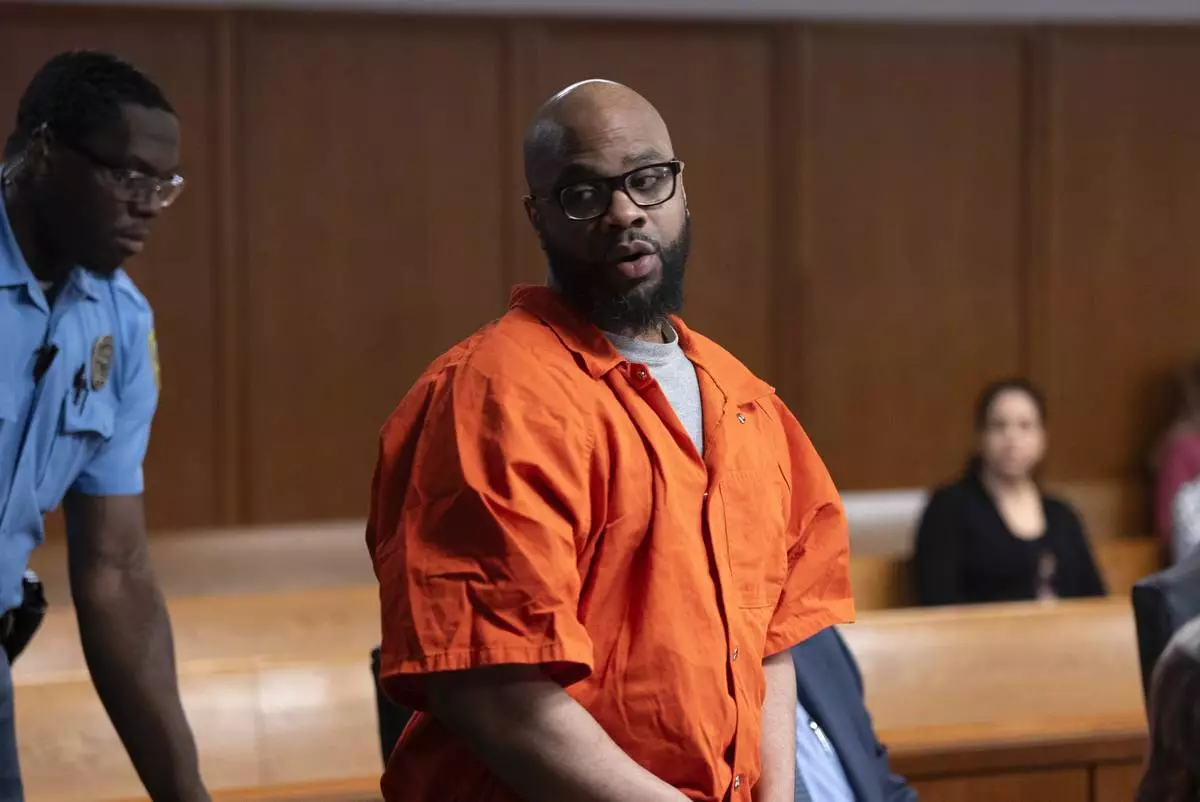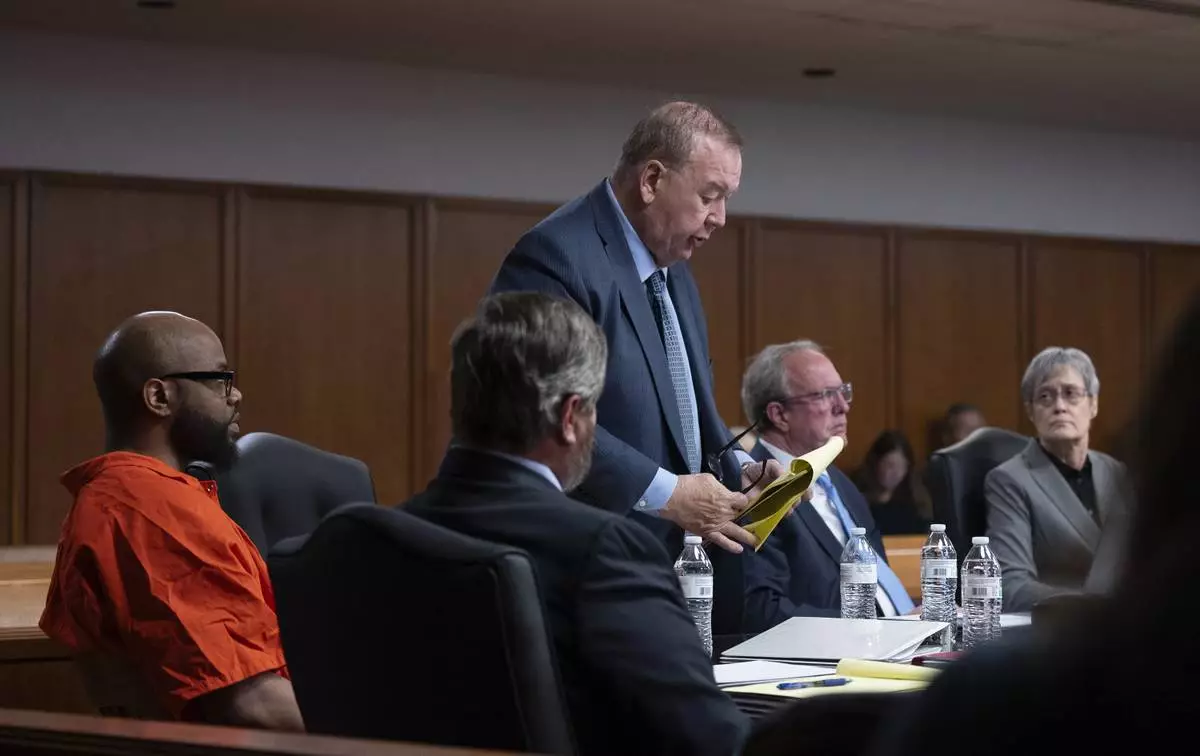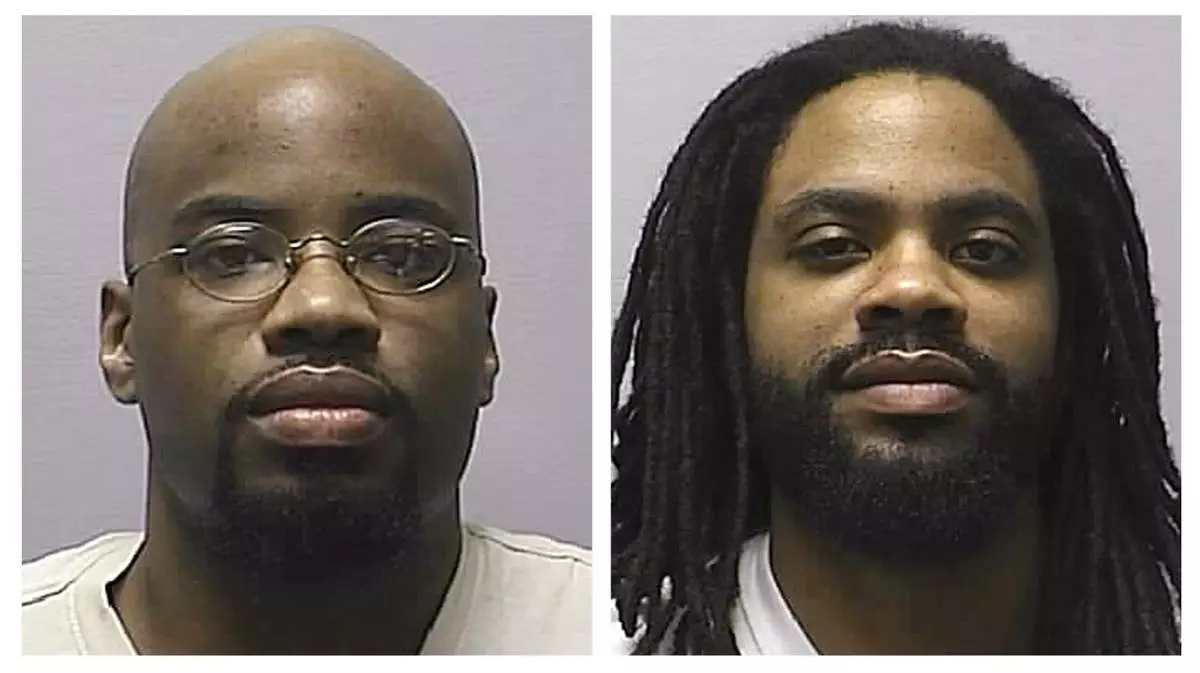An unrepentant Ratko Mladic, the bullish Bosnian Serb general whose forces rained shells and snipers' bullets on Sarajevo and carried out the worst massacre in Europe since World War II, was convicted Wednesday of genocide and other crimes and sentenced to spend the rest of his life behind bars.
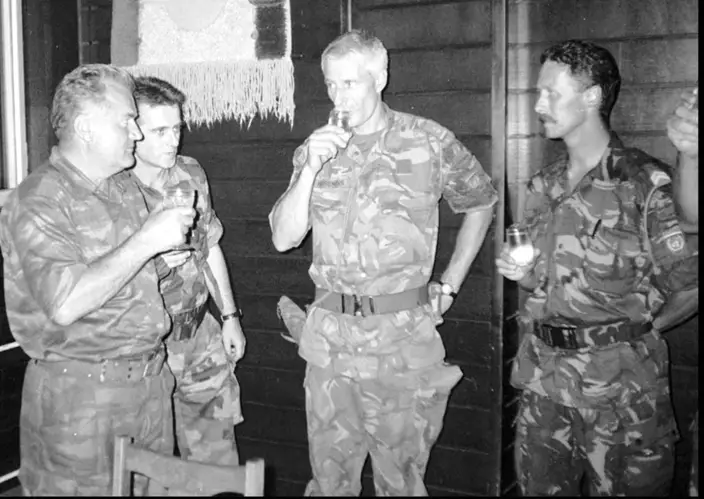
FILE - In this July 12, 1995 photo, Bosnian Serb army Commander General Ratko Mladic, left, drinks toast with Dutch U.N Commander Tom Karremans, second right, while others unidentified look on in village of Potocari, some 5 kilometers (3 miles) north of Srebrenica. Ratko Mladic will learn his fate on Nov. 22, 2017, when U.N. judges deliver verdicts in his genocide and war crimes trial. (AP Photo)
Defiant to the last, Mladic was ejected from a courtroom at the United Nations' Yugoslav war crimes tribunal after yelling at judges: "Everything you said is pure lies. Shame on you!"
He was dispatched to a neighboring room to watch on a TV screen as Presiding Judge Alphons Orie pronounced him guilty of 10 counts that also included war crimes and crimes against humanity.
Human-rights organizations hailed the convictions as proof that even top military brass long considered untouchable cannot evade justice forever. Mladic spent years on the run before his arrest in 2011.

FILE - In this April 9, 1994 file photo, former Bosnian Serb commander Ratko Mladic, right, leaves the UN headquarters at Sarajevo airport after talks with the UN General, Sir Michael Rose and Bosnian Commander Rasim Delic. Ratko Mladic will learn his fate on Nov. 22, 2017, when U.N. judges deliver verdicts in his genocide and war crimes trial. (AP Photo/Enric Marti, File)
"This landmark verdict marks a significant moment for international justice and sends out a powerful message around the world that impunity cannot and will not be tolerated," said John Dalhuisen, Amnesty International's Europe director.
For prosecutors, it was a fitting end to a 23-year effort to mete out justice at the U.N. tribunal for atrocities committed during the Balkan wars of the early 1990s. Mladic's conviction signaled the end of the final trial before the tribunal closes its doors by the end of the year.

Bosnian Serb men watch a live broadcast of former Bosnian Serb military chief Gen. Ratko Mladic's trial in Sokolac, Bosnia, Wednesday, Nov. 22, 2017. (AP Photo/Radul Radovanovic)
But legal battles will continue. Mladic's attorneys vowed to appeal his convictions on 10 charges related to a string of atrocities from the beginning of the 1992-95 Bosnian war to its bitter end.

FILE - A May 29, 2011 file photo shows Bosnian Serb protesters holding posters depicting former Bosnian Serb army chief Ratko Mladic, during a protest in Mladic's hometown of Kalinovik, Bosnia-Herzegovina. Ratko Mladic will learn his fate on Nov. 22, 2017, when U.N. judges deliver verdicts in his genocide and war crimes trial. (AP Photo/Amel Emric, File)
"The defense team considers this judgment to be erroneous, and there will be an appeal, and we believe that the appeal will correct the errors of the trial chamber," Mladic lawyer Dragan Ivetic said.
Mladic's son, Darko, said his father told him after the verdict that the tribunal was a "NATO commission ... trying to criminalize a legal endeavor of Serbian people in times of civil war to protect itself from the aggression."
Presiding Judge Alphons Orie started the hearing by reading out a litany of horrors perpetrated by forces under Mladic's control.
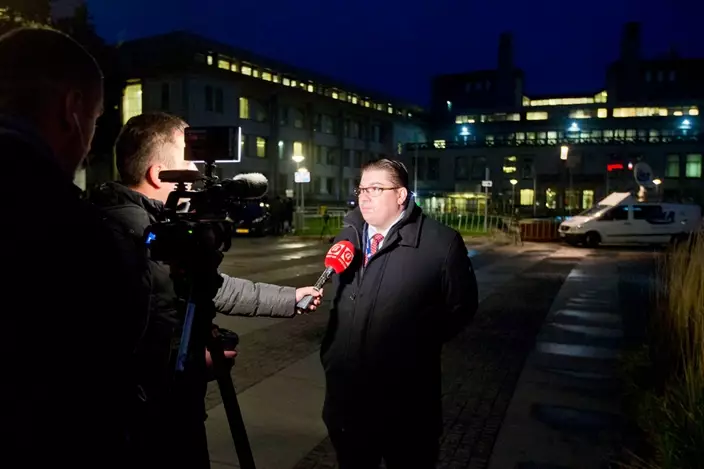
Dragan Ivetic, lawyer for former Bosnian Serb military chief Ratko Mladic, is interviewed in front of the Yugoslav War Crimes Tribunal where the court is scheduled to hand down the verdict in the genocide case against Mladic, in The Hague, Netherlands, Wednesday, Nov. 22, 2017.(AP Photo/Peter Dejong)
"Detainees were forced to rape and engage in other degrading sexual acts with one another. Many Bosnian Muslim women who were unlawfully detained were raped," Orie said.
The judge recounted the story of a mother who ventured into the streets during the deadly siege of Sarajevo with her son as Serb snipers and artillery targeted the Bosnian capital. She was shot. The bullet passed through her abdomen and struck her 7-year-old son's head, killing him.
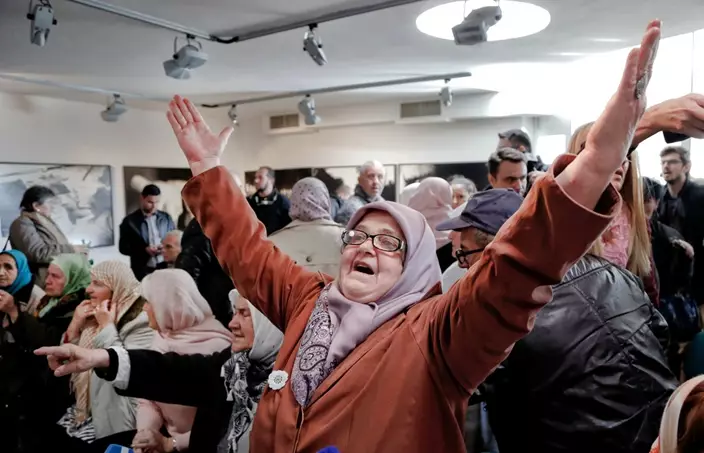
A Bosnian woman raises her arms upon hearing the sentence at the end of former Bosnian Serb military chief Gen. Ratko Mladic's trial at the memorial center in Potocari, near Srebrenica, Bosnia, Wednesday, Nov. 22, 2017. A U.N. court has convicted former Bosnian Serb military chief Gen. (AP Photo/Amel Emric)
In Srebrenica, the war reached its bloody climax as Bosnian Serb forces overran what was supposed to be a U.N.-protected safe haven. After busing away women and children, Serb forces systematically murdered some 8,000 Muslim males.

Satellite trucks and cameras are set up outside the Yugoslav War Crimes Tribunal, rear, where the court is scheduled to hand down the verdict in the genocide case against Bosnian Serb military chief Ratko Mladic, in The Hague, Netherlands, Wednesday, Nov. 22, 2017. (AP Photo/Peter Dejong)
"Many of these men and boys were cursed, insulted, threatened, forced to sing Serb songs and beaten while awaiting their execution," Orie said.
Mladic looked relaxed as the hearing started, greeting lawyers, crossing himself and giving a thumbs-up to photographers in court. But midway through the hearing Mladic's lawyer, Dragan Ivetic, asked for a delay because the general was suffering from high blood pressure. The judge refused, Mladic started yelling and was tossed out of court.
When he started speaking, "it was not about his health but much more I think trying to insult the judges," Chief Prosecutor Serge Brammertz said.
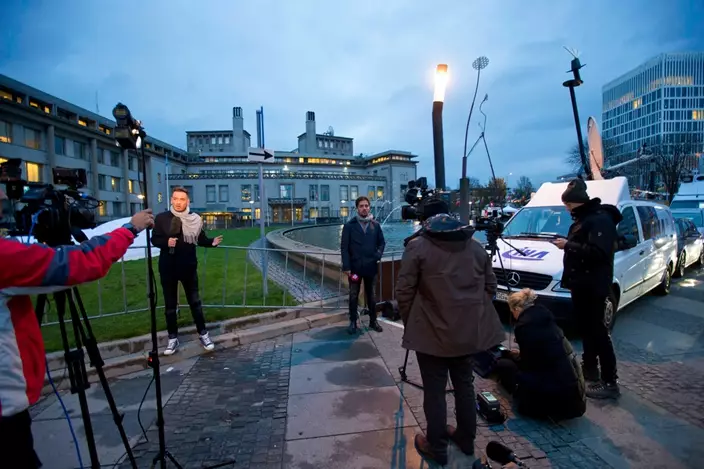
Satellite trucks and cameras are set up outside the Yugoslav War Crimes Tribunal, rear center, where the court is scheduled to hand down the verdict in the genocide case against Bosnian Serb military chief Ratko Mladic, in The Hague, Netherlands, Wednesday, Nov. 22, 2017. (AP Photo/Peter Dejong)
The conflict in the former Yugoslavia erupted after the country's breakup in the early 1990s, with the worst crimes taking place in Bosnia. More than 100,000 people died and millions lost their homes before a peace agreement was signed in 1995. Mladic went into hiding for around 10 years before his arrest in Serbia in May 2011.
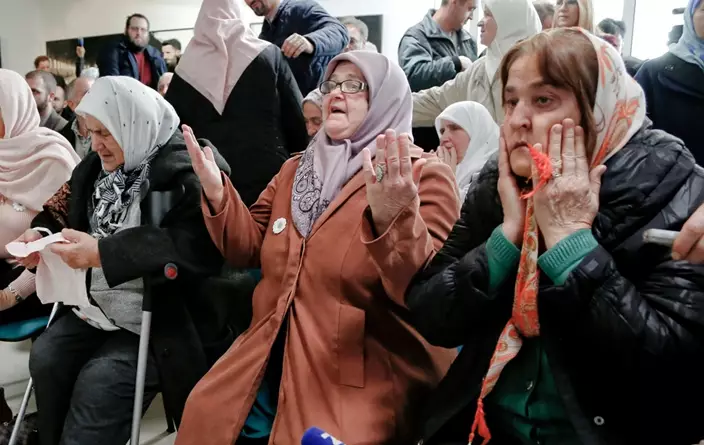
Bosnian women react upon hearing the sentence at the end of former Bosnian Serb military chief Gen. Ratko Mladic's trial at the memorial center in Potocari, near Srebrenica, Bosnia, Wednesday, Nov. 22, 2017. (AP Photo/Amel Emric)
Mladic's political master during the war, former Bosnian Serb President Radovan Karadzic, was also convicted last year for genocide and sentenced to 40 years. He has appealed the ruling.
The man widely blamed for fomenting wars across the Balkans, former Yugoslav President Slobodan Milosevic, died in his U.N. cell in 2006 before tribunal judges could reach verdicts in his trial.

Satellite trucks and cameras are set up outside the Yugoslav War Crimes Tribunal, rear, where the court is scheduled to hand down the verdict in the genocide case against Bosnian Serb military chief Ratko Mladic, in The Hague, Netherlands, Wednesday, Nov. 22, 2017. (AP Photo/Peter Dejong)
The ethnic tensions that Milosevic stoked from Belgrade simmer to this day.
Top Bosnian Serb political leader Milorad Dodik said the tribunal only underscored its anti-Serb bias by convicting Mladic. Dodik said the court was established with the "single purpose" of demonizing Serbs.
"This opinion is shared by all the Serbs," Dodik said, describing Mladic as "a hero and a patriot."
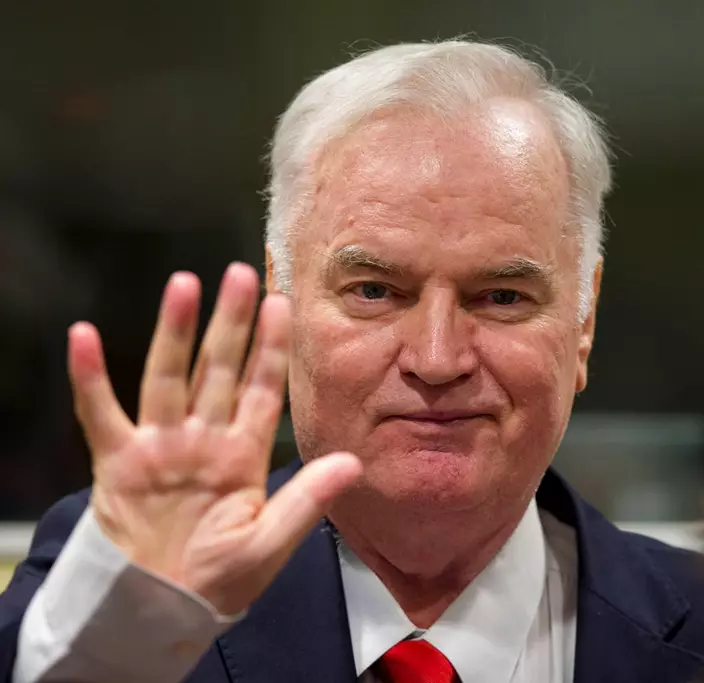
Bosnian Serb military chief Ratko Mladic waves as he enters the Yugoslav War Crimes Tribunal in The Hague, Netherlands, Wednesday, Nov. 22, 2017, to hear the verdict in his genocide trial. (AP Photo/Peter Dejong, Pool)
Serbian President Alksandar Vucic, a former ultranationalist who supported Mladic's war campaigns but now casts himself as a pro-EU reformer, agreed that the court has been biased against Serbs but added that "we should not justify the crimes committed" by the Serbs.
"We are ready to accept our responsibility" for war crimes "while the others are not," he said.
For a former prisoner of Serb-run camps in northwestern Bosnia who was in The Hague, the verdict was sweet relief.
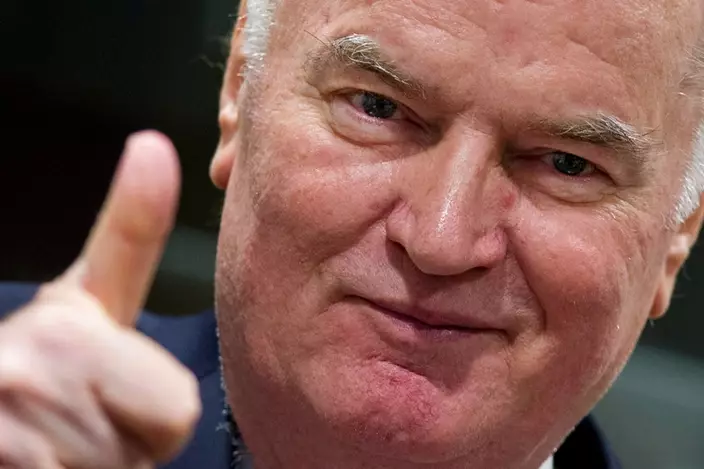
Bosnian Serb military chief Ratko Mladic flashes a thumbs up as he enters the Yugoslav War Crimes Tribunal in The Hague, Netherlands, Wednesday, Nov. 22, 2017, to hear the verdict in his genocide trial. (AP Photo/Peter Dejong, Pool)
Fikret Alic became a symbol of the horrors in Bosnia after his skeletal frame was photographed by Time magazine behind barbed wire in 1992 in a Bosnian Serb camp.
"Justice has won," he said. "And the war criminal has been convicted."

Bosnian Serb men watch a live broadcast of former Bosnian Serb military chief Gen. Ratko Mladic's trial in Sokolac, Bosnia, Wednesday, Nov. 22, 2017. (AP Photo/Radul Radovanovic)

Bosnian Serb men watch a live broadcast of former Bosnian Serb military chief Gen. Ratko Mladic's trial in Sokolac, Bosnia, Wednesday, Nov. 22, 2017. (AP Photo/Radul Radovanovic)
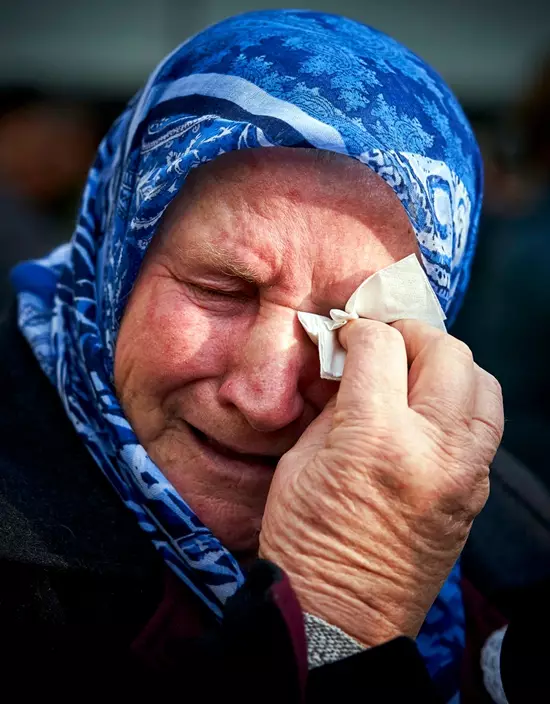
Nura Mustafic, one of the Mothers of Srebrenica and other Bosnian organizations, wipes away tears as she reacts to the verdict which the Yugoslav War Crimes Tribunal, ICTY, handed down in the genocide trial against former Bosnian Serb military chief Ratko Mladic, in The Hague, Netherlands, Wednesday Nov. 22, 2017.(AP Photo/Phil Nijhuis)



